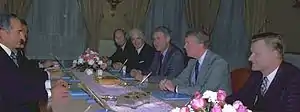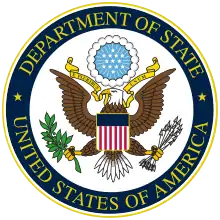Alfred Atherton
Alfred Leroy "Roy" Atherton Jr. (November 22, 1921 – October 30, 2002) was a United States Foreign Service Officer and diplomat. He served as United States Ambassador to Egypt in 1979–1983.[1] He was a Middle East expert who helped in the negotiations that led to the 1978 Camp David peace accords between Israel and Egypt.[2]
Alfred L. Atherton Jr. | |
|---|---|
 | |
| United States Ambassador to Egypt | |
| In office July 2, 1979 – November 12, 1983 | |
| President | Jimmy Carter Ronald Reagan |
| Preceded by | Hermann F. Eilts |
| Succeeded by | Nicholas A. Veliotes |
| Personal details | |
| Born | November 22, 1921 Pittsburgh, Pennsylvania, U.S. |
| Died | October 30, 2002 (aged 80) Washington, D. C., U.S. |
| Alma mater | Harvard University |
 |
| U.S. Near Eastern Affairs Diplomats |
|---|
|
Loy W. Henderson (1922–1960) |
Early life
Atherton was born on November 22, 1921, in Pittsburgh, Pennsylvania, the son of Alfred Leroy Atherton Sr.[3] and Joanna Reed.
Education
He graduated from Phillips Exeter Academy. He received a B.S. in 1944 and an M.A. in 1947 from Harvard University. He served in the U.S. Army in Europe from 1943 to 1945. He received a Master’s degree in economics from the University of California in Berkeley.
Diplomatic career
Foreign service (1947-1961)
Atherton joined the U.S. Foreign Service in 1947, and served in Stuttgart, Bonn, Damascus, and Aleppo. From 1959 to 1961, he was Iraq-Jordan desk officer, then Officer in Charge for Cyprus, in the Bureau of Near Eastern and South Asian Affairs at the State Department. During 1961-62 he took advanced economic studies at the University of California at Berkeley.[4]
Middle East Affairs (1965-1978)
Between 1965 and 1966, he was Deputy Director of the Office of Near Eastern Affairs at the State Department. In 1966 and 1967, he was Country Director for Iraq, Jordan, Lebanon, and Syria. From 1967 to 1970, he was Country Director for Israel and Arab-Israel Affairs. From 1970 to 1974, he was Deputy Assistant Secretary of State for the Bureau of Near Eastern and South Asian Affairs. From 1974 to 1978, he was Assistant Secretary for Near Eastern and South Asian Affairs.[6][7]
Ambassador at large: Camp David Summit
He became an Ambassador-at-large[8] and was a member of the U.S. negotiating team at the Camp David summit in September 1978.[9]
The summit produced the Camp David Accords. Atherton had spent months preparing both parties for the summit.[10]
Egypt (1979-1983)
He served as United States Ambassador to Egypt [11] from 1979 to 1983, where he was responsible for the largest U.S. mission in the world, with a staff of 872 Americans and 500 Egyptians. After the Camp David Accord many staff were dispatched to help administer the $1.5 billion a year in military assistance. During his tenure the Egyptian President Anwar Sadat was assassinated. After completing his final overseas tour he returned to Washington D.C.[12]
Director General of the Foreign Service (1983-1985)
This was his final post prior to retiring from the service in 1985.
Service chronology
| Position | Host country or organization | Year |
|---|---|---|
| US State Department Vice Consul | Stuttgart, Germany | 1947–1949 |
| US State Department Political Reports Office | Bonn, Germany | 1949–1952 |
| US State Department Second Secretary-Vice Consul | Damascus, Syria | 1952–1956 |
| US State Department Consul | Aleppo, Syria | 1956–1959 |
| US State Department Iraq-Jordan Desk, International Relations Office | Washington D.C. | 1959–1961 |
| US State Department Economic Officer | Calcutta, India | 1962–1965 |
| US State Department Deputy Director of the Office of Near Eastern Affairs | Washington D.C. | 1965–1966 |
| US State Department Country director for Iraq, Jordan, Lebanon, and Syria | Washington D.C. | 1966–1967 |
| US State Department Country director for Israel and Arab-Israel Affairs | Washington D.C. | 1967–1970 |
| US State Department Deputy Asst. Secy. for Near Eastern & South Asian Affairs | Washington D.C. | 1970–1974 |
| US Assistant Secretary of State for Near East Affairs [13] | Washington D.C. | 1974–1978 |
| US Ambassador at Large [14] | Washington D.C. | 1978–1979 |
| US Ambassador to Egypt | Cairo, Egypt | 1979–1983 |
| US State Department Director General of the Foreign Service | Washington D.C. | 1983-1985 |
Memberships, awards and affiliations
- Director of the Harkness Fellowship Program of the Commonwealth Fund of New York
- Director of the Una Chapman Cox Foundation
Academic career
He was a visiting professor of Middle Eastern Affairs at Hamilton College as Sol M. Linowitz Visiting Professor of Government (1991-1992). There, he taught a small seminar on the history and dynamics of the Arab-Israeli conflict. He also was a visiting professor at Mount Holyoke and Birmingham Southern Colleges.[15]
Personal
He married Betty Wylie (1921-2001) from Chicago, Illinois. They had three children; Lynne, Reed and Michael.[16]
He was a member of All Souls Unitarian Church in Washington D.C.
Death
He died at Sibley Memorial Hospital in Washington, on October 30, 2002[17] from complications related to cancer surgery.[18] He is buried at Rock Creek Cemetery, Washington D.C. [19] along with his wife, Betty Wylie [20] who died on February 18, 2009.
Ancestry
His paternal ancestors had resided in Lancaster, Massachusetts having been pioneer settlers to the area. He is a direct descendant of James Atherton,[21] who arrived in Dorchester, Massachusetts, in the 1630s.[22] The Atherton family ancestry originated from Lancashire, England.
Further reading
- Eilts, Hermann Fr. "Alfred Leroy (Roy) Atherton, Jr. (1921-2002). (In Memoriam)." Washington Report on Middle East Affairs, vol. 22, no. 1, Jan.-Feb. 2003, p. 45+. Gale General OneFile, [23]
References
- United States Ambassador to Egypt Nomination of Alfred L. Atherton, Jr., May 8, 1979
- "10 years after Camp David - recognition of Atherton".
- "Atherton One Name Study entry for Alfred Leroy Atherton Sr".
- Mak, Dayton (1990). "AMBASSADOR ALFRED LEROY ATHERTON, JR" (PDF). The Association for Diplomatic Studies and Training Foreign Affairs Oral History Project.
- "Association for Diplomatic Studies & Training - Trouble in the Mountains article".
- Reuters. "U.S. Under Secretary of State Atherton down aircraft steps and greeted by U.S. Ambassador to Algeria, Mr. Parker Silent: March 1, 1976".
- "President Carter Library - documents relating to the role of Roy Atherton".
- "Jewish Telegraphic Agency article on Atherton's nomination for new Middle East role".
- "National Archives - President J Carter Library - Roy Atherton papers".
- "Atherton briefs Dayan in Feb 1978".
- "New York Times Article: President J Carter names A L Atherton as future Ambassador to Egypt".
- "The American Presidency Project: President J Carter names A L Atherton as future Ambassador to Egypt".
- "Atherton named in leak - reprimanded".
- "Atherton is nominated to be Ambassador at large dealing with Middle East issues".
- "Secretary Colin Powell eulogy".
- "Secretary Colin Powell eulogy".
- "Atherton obituary in the Los Angeles Times".
- "Foreign Service Journal; Feb 2003" (PDF). p. 7.
- Alfred Atherton at Find a Grave

- Mary Louise Weiss, ed. (1987). "The Association for Diplomatic Studies and Training Foreign Affairs Oral History Program Foreign Service Spouse Series BETTY ATHERTON" (PDF).
- "James Atherton entry on the Atherton ONS".
- "James Atherton of Dorchester settled in Lancaster Massachusetts in 1654".
- Eilts, Hermann Fr. "Alfred Leroy (Roy) Atherton, Jr. (1921-2002). (In Memoriam)". Washington Report on Middle East Affairs, vol. 22, no. 1, Jan-Feb 2003. p. 45.
External links
| Government offices | ||
|---|---|---|
| Preceded by Joseph J. Sisco |
Assistant Secretary of State for Near Eastern and South Asian Affairs April 27, 1974 – April 13, 1978 |
Succeeded by Harold H. Saunders |
| Diplomatic posts | ||
| Preceded by Hermann F. Eilts |
United States Ambassador to Egypt July 2, 1979 – November 12, 1983 |
Succeeded by Nicholas A. Veliotes |